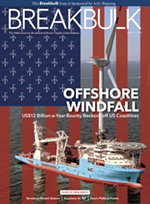Sep 07 | 2021
Differentiation, Agility Key for Success

 By Philip Ovanessians
By Philip OvanessiansHow can engineering, procurement, construction and fabrication, or EPCF, firms that typically have served the traditional hydrocarbons market transition to the renewables space?
In my experience hydrocarbons complement renewables. It is not one or the other. What I have seen in the past 18 months is there has been an increase in activity with national chemical manufacturers in Africa, Asia, the Americas and the Middle East. Some of these customers I currently support remotely.
For an EPCF to transition to renewables is not a major step change. Examples are:
• Partnering with select module fabricators to provide structural steel supports to offshore wind farms.
• Increasing implementation of carbon capture and storage units in liquefied natural gas, thermal power, and chemical plants.
• Teaming with a regional and/or specialty niche general services contractor that operates in the hydrogen and nuclear power markets.
• Early on engagement with developers in the project development phase to incorporate solar, hydro and wind power as an energy feedstock.
• Partnering with subsea vessel providers to offer environmentally safe, cost effective solutions in the offshore wind market.
• Establishing agreements with rail and surface transporters to provide process modularize transport.
Engineering as a Commodity Market
The trend in both the hydrocarbons and renewables markets continue to push engineering to be more of a commodity market. Contractors, now more than ever, need to bolster their commercial acumen to assist owners and developers early on in the conceptual stage of the project to:
• Seek financial capital.
• Provide estimates that have current factors.
• Have a good understanding of the various commercial and schedule models.
• Determine how to best handle the risks associated with each of them.
• Have proper change management processes during the execution phase.
While there is no one solution in energy transition, the focus should be on what differentiates your company as an EPCF contractor from your competitors, and whether your organization is agile enough.
Philip Ovanessians is vice president of commercial management for Worley, an Australian engineering company which provides project delivery and consulting services to the resources and energy sectors, and complex process industries.
Philip will participate in the Breakbulk Americas panel, “Oil & Gas: Their Role in the Energy Transition,” which will be held at 11:30 a.m. to 12:15 p.m., Sept. 30.
Image credit: Shutterstock
